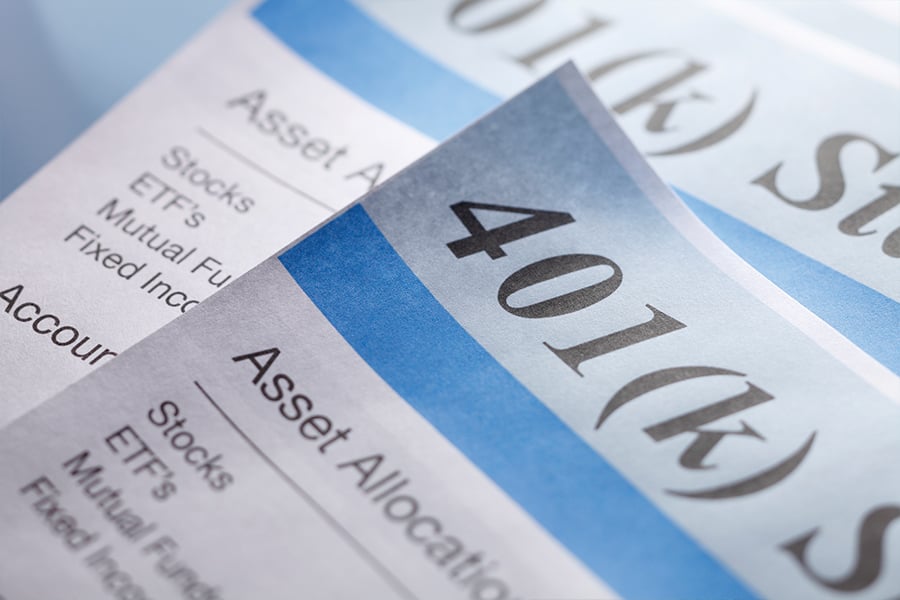American investors have been pouring money into funds focused on environmental and social good, but among those investors has been one notable exception: participants in
workplace retirement plans.
But this is likely to change according to experts, who believe 401(k) and other defined-contribution plans will be a major growth driver in future years for such investment strategies, due to a shift in investor demographics and a pivot by asset managers.
"[ESG funds] will become a large percentage of the 401(k) savings universe over the coming decade," said Ed Farrington, head of retirement at Natixis Investment Managers.
The universe of sustainable investing, which uses environmental, social and governance criteria to guide investment decisions, holds $12 trillion in assets in the U.S. — or roughly 26% of the $47 trillion pool of professionally managed assets in the U.S. at the end of 2017, according to the Forum for Sustainable and Responsible Investment.
ESG-focused mutual and
exchange-traded funds pulled in a net $5.5 billion in 2018 — the third consecutive year of record annual net flows, according to Morningstar Inc. By June 30 this year, ESG funds already had double the amount of last year's inflows.
However, investor zeal for ESG funds hasn't translated into greater options within 401(k) plans.
Only 4% of 401(k) plans have an ESG fund available for investment by plan participants, and ESG funds only hold 0.03% of 401(k) assets, according to the Plan Sponsor Council of America.
"It seems really limited," said Todd Levy, chief investment officer at advisory firm Ingham Retirement Group. "I can't recall the last plan sponsor that proactively asked about [ESG]."
[
Recommended video:
Next generation clients want advisers to help them live better lives]
Several headwinds have contributed to this muted uptake, experts said. For one, investment committees with a fiduciary responsibility to their 401(k) plans tend to be conservative and move cautiously.
The Trump administration has also sowed regulatory confusion for plan sponsors. The
Department of Labor in April issued guidance that said investments based on ESG factors aren't always a "prudent choice" and that such factors shouldn't be "too readily" considered as economically relevant by 401(k) plan fiduciaries.
Additionally, myths about ESG underperformance abound — even if not rooted in reality, experts said.
Overall, plan sponsors that add funds largely don't choose ESG funds as a plan's default investment, such as target-date funds, which garner the lion's share of 401(k) contributions. About 58% of 401(k) contributions are directed to TDFs, according to consulting firm Cerulli Associates, which projects an increase in that figure to more than 80% in 2023.
"To really get ESG embedded in the 401(k) world, it probably needs to happen through TDFs," said Jon Hale, head of sustainability research at Morningstar.
While there's been a
proliferation of ESG-focused mutual and exchange-traded funds — 279 as of midyear, according to Morningstar — that hasn't been the case with TDFs. Natixis Sustainable Future Funds is the only target-date suite available to workplace retirement plans.
This means that while there are many options available to plan sponsors to choose as a standalone fund on a 401(k) menu, there's a dearth of products available in the most impactful 401(k) fund category.
The Natixis TDFs hold $45 million, according to Mr. Farrington. Roughly 50 plans are currently using the funds, and an additional 50 have signed agreements to add them. He expects that number to jump after February 2020 because that will mark the fund's three-year anniversary and being able to show three years of results is often important for advisers' investment screens.
A handful of other asset managers are currently developing ESG target-date products, said Michael Young, the manager of education programs at the Forum for Sustainable and Responsible Investment. He declined to name the specific firms.
Once other products become available, "there will be a massive shift in assets," Mr. Young said.
Demographics make this a near certainty over time, proponents said, especially as
millennials age and become a more economically salient portion of the workforce. Deloitte estimates millennials will comprise 75% of the global workforce by 2025. Two-thirds of millennials said they'd increase their 401(k) contributions if they knew their investments were doing social good, according to a Natixis survey.
Demand for ESG strategies will likely come from plan sponsors leveraging these funds as a way to attract and retain young talent, Mr. Hale said.
"I don't know that the retirement space in the near term will be a driver of ESG asset growth in the U.S.," said Mr. Young. "But I believe it will happen."







